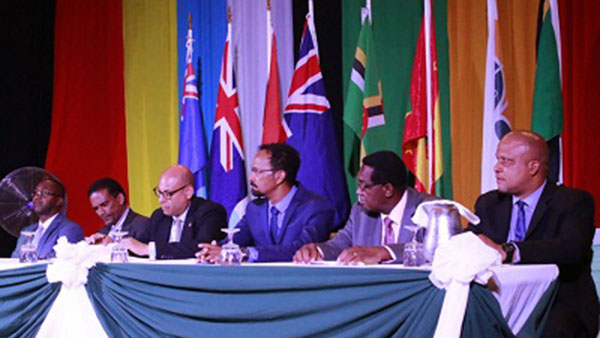CASTRIES, St. Lucia, July 26, 2018 (CMC) – Ministers of Environment in the Eastern Caribbean have identified several areas, for greater collaboration and unified action, to address a number of climate change issues affecting the region.
Speaking at a press briefing following the recent conclusion of the Organization of Eastern Caribbean States (OECS) 5th Council of Ministers of Environment and Sustainability (COMES5) Meeting, incoming Council Chair, David Osborne, of Montserrat, gave his commitment to continue the dialogue and work with the Ministers of Environment, from across the region, to find solutions to several challenges, such as the invasion of Sargassum seaweed.
He said the prevalence of the Sargassum seaweed in the region is a critical situation and needs urgent attention. That issue, Osborne said, along with the need for prompt and proper aid to be provided to disaster stricken islands, were among the topics of discussion.
As incoming Chair of the Council, Minister Osborne is expected to coordinate the implementation of the recommendations coming out of the meeting, over the course of the year.
Outgoing Chair, Grenada’s Minister for Climate Resilience, the Environment, Forestry, Fisheries and Disaster Management, Simon Stiell, said, during the meeting, that significant effort was placed on looking at what took place in last year’s hurricane season and the impact it had on member states.
Minister Stiell also shared his views on the need for a collective approach to climate change.
“The spirit that is engendered within the commission is that of identifying common agendas and common ground that not only unite us, in terms of the challenges we face, but in terms of identifying the collective solutions. So rather than seeing the challenges on a national level, alone, and trying to come up with national solutions, there is need for us to work collectively,” he said.
The COMES5 meeting was held under the theme ‘Building Resilience on the Frontlines of Climate Change’.
Following the meeting, a signing ceremony for a project, which will contribute to the preservation of Caribbean ecosystems, took place.
The ‘Integrating Water, Land and Ecosystems Management in Caribbean Small Island Developing States’ (IWEco) project is valued at US$20 million and is expected to have three outcomes: enhanced livelihood opportunities and socio-economic co-benefits for targeted communities from improved ecosystem services functioning; strengthened national and regional systems for monitoring of environmental status, with respect to key international agreements; and strengthened capacity of national and regional institutions and other stakeholders for water, land, and ecosystems management that accounts for climate change.
The participating OECS countries that will be implementing the project are Antigua and Barbuda, Grenada, St. Kitts and Nevis, St. Lucia and St. Vincent and the Grenadines.
 Pride News Canada's Leader In African Canadian & Caribbean News, Views & Lifestyle
Pride News Canada's Leader In African Canadian & Caribbean News, Views & Lifestyle





